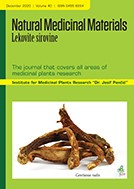Faculty of Technology, University of Novi Sad , Novi Sad , Serbia
Faculty of Technology, University of Novi Sad , Novi Sad , Serbia
Faculty of Technology, University of Novi Sad , Novi Sad , Serbia
Institute of Field and Vegetable Crops , Belgrade , Serbia
Faculty of Technology, University of Novi Sad , Novi Sad , Serbia
In this study, supercritical carbon dioxide was applied for the extraction of Artemisia annua L. Moreover, the impact of different parameters of supercritical extraction on total yield was investigated and the obtained yields were compared to the ones obtained by conventional procedures, hydrodistillation and Soxhlet extraction. Supercritical fluid extraction at 40°C and different pressures (100, 200, and 300 bar) resulted in extraction yields that were in the 2.23-5.18% range, while the yields at 60°C and the same pressures were in the range 2.43-3.35%. The yields obtained by the Soxhlet extraction and hydrodistillation were 0.1% and 10.28%, respectively. Although supercritical fluid extraction is inferior to Soxhlet extraction in terms of the recovery of lipophilic components of A. annua, the Soxhlet extraction is not the method of choice for obtaining sweet wormwood extracts due to its numerous disadvantages that include the use of toxic solvents, extended extraction time, health safety of the product, the need for further processing, the impossibility of adjusting the selectivity and thus the composition of the product.
This is an open access article distributed under the Creative Commons Attribution License which permits unrestricted use, distribution, and reproduction in any medium, provided the original work is properly cited.

The statements, opinions and data contained in the journal are solely those of the individual authors and contributors and not of the publisher and the editor(s). We stay neutral with regard to jurisdictional claims in published maps and institutional affiliations.